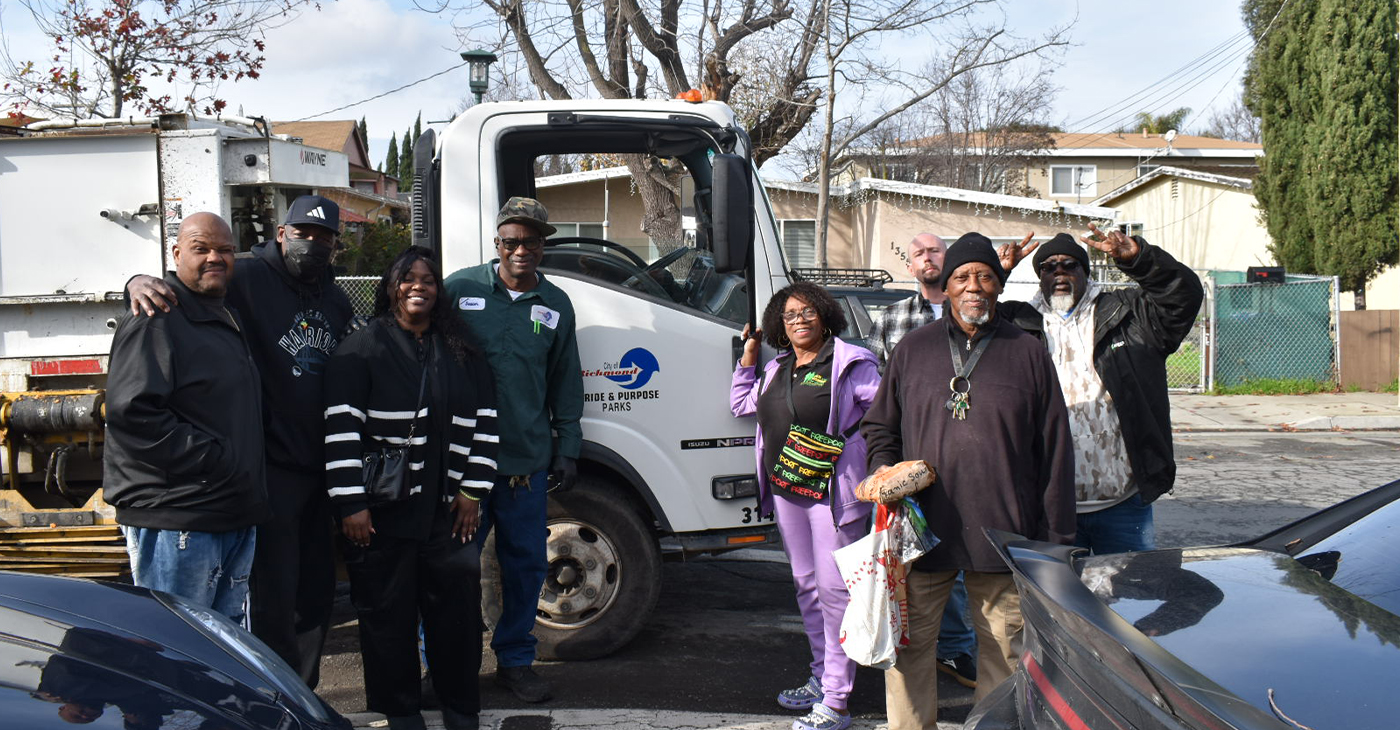Employment
Lawmakers Approve “Upward Mobility” Bill, Proposing More Slots for Blacks on State Boards, Commissions
The bill also directs the Department of Human Resources (CalHR) to develop model upward mobility goals to include race, gender, and LGBTQ identity as factors to the extent permissible under state and federal equal protection laws.

Assemblymember Chris Holden’s (D-Pasadena) ‘Upward Mobility Bill’ (AB 105) passed the California State Senate with a 29-to-8 vote on September 9.
The legislation promotes more opportunities for people of color in California’s civil services system and requires diversity on state boards and commissions. The bill now heads to the governor’s desk to either be signed into law or to be vetoed.
“Upward mobility is integral to achieving racial justice, and we should be setting the example,” said Holden. “The existing systems in place at our own state agencies fail to create inclusive workplace environments and hinder qualified individuals to move up within their department simply based on the color of their skin. Today, the Legislature took a bold step to fix the problem.”
Specifically, AB 105 would require the California State Personnel Board (SPB) to establish a process that includes best practices and emphasizes diversity in the announcement, design, and administration of exams for potential state employees.
The bill also directs the Department of Human Resources (CalHR) to develop model upward mobility goals to include race, gender, and LGBTQ identity as factors to the extent permissible under state and federal equal protection laws.
Additionally, AB 105 calls for state agencies to collect and report demographic data using more nuanced categories of Californians of African descent, similar to the data collected for Californians of Asian descent. This data will be critical in accurately reporting who among Californians of African descent is experiencing barriers to upward mobility.
Last year, Gov. Gavin Newsom signed AB 3121 into law, which was authored by former Assemblymember Dr. Shirley Weber, who is now Secretary of State. That bill established a task force to study and develop reparations proposals for African Americans. AB 105 would give the task force more accurate data to utilize in its deliberations.
CalHR data shows that the majority of non-white civil service personnel are paid a salary in the “$40,000 and below” range. When the salary range increases, the percentage of non-white civil servants working in upper-level or management positions decreases. The opposite is true for white civil servants who dominate in management and upper-level civil service positions.
The Sacramento Bee has published a series of letters written on behalf of Black employees working at state agencies such as the California Air Resources Board (CARB) and the California Department of Corrections and Rehabilitation with detailed accounts of how Black employees are passed up for promotions over white employees. The problem, however, is not limited to upward mobility. In early November, three Black employees at the California Office of Publishing found racial slurs written on cards at their desk.
“We already mandated the private sector to do their part. It’s time for the state to step up and do theirs,” said Holden.
Newsom has until Oct. 10, 2021, to sign the legislation.
Community
Richmond Nonprofit Helps Ex-Felons Get Back on Their Feet
For 20 years now, at a small center in North Richmond, Men and Women of Valor (MVOV) has been helping to rehabilitate ex-felons, giving them a second chance at life. Pam Saucer, the founder and CEO of MWOV, has long been a leader in the community, advocating for — and educating — at-risk youth and formerly incarcerated men and women.

By Magaly Muñoz
For 20 years now, at a small center in North Richmond, Men and Women of Valor (MVOV) has been helping to rehabilitate ex-felons, giving them a second chance at life.
Pam Saucer, the founder and CEO of MWOV, has long been a leader in the community, advocating for — and educating — at-risk youth and formerly incarcerated men and women.
The center offers these newly released ex-felons opportunities to get their GED, participate in community service projects, and obtain transitional housing while they get back on their feet.
“We’re giving back to the community and have had a positive impact. We go as far as cleaning up the area because you have to have a clean heart and a clean mind to want to do something productive,” Saucer said.
Take the case of Kiaira Fluker, 35, who had a probation violation in 2019 that caused her to spend 105 days in jail. After that experience, Fluker swore she’d do everything she could to never go back.
Fluker shared that she was referred to MWOV and, soon after, she learned about the rehabilitation program Saucer ran.
Fluker said the program provided her with job opportunities and life skills that have allowed her to stabilize herself and her three kids, who often visit the center as well. Being around the team at the center created a positive atmosphere for Fluker and made her realize that the people she was surrounding herself with in her past was not what she needed in her life anymore.
“I was blessed. If I hadn’t found Ms. Pamela, I would’ve lost everything from my housing and probably custody of my children,” Fluker said.
Although the center has been operating since 2005, Saucer’s work with disadvantaged youth and the formerly incarcerated has gone beyond the Richmond center. Many of the volunteers working there had known her for years before she took on the challenge of running her own organization.
Antayon Alexander, one of MWOV’s volunteers, shared that he has worked with Saucer since the ’90s and that she helped him develop the skills to run a transitional housing unit in Sonoma for two years.
Alexander had served three years in prison on a narcotics charge and has been on parole for over 30 years. He wasn’t proud of where he wound up at such a young age and did the work “day-in-and-day out” to not end up back in prison.
Alexander stressed to the men in the housing that this was their opportunity for a second chance at life and to better themselves, similar to his own experience after meeting Saucer. Alexander could relate to them on a level of understanding that transitioning out of incarceration was never easy work, but it was up to them to maintain clean and healthy paths in order to not recommit their crimes.
“We were all cut from the same cloth,” he said.
Alexander had spent a few years with Richmond Unified School District working with kids in group homes and running a special education school. He wants to work towards starting his own nonprofit, similar to MWOV, to continue giving back to the community in the way he knows best.
To ease the growing costs of gas and in some cases, not being able to obtain a drivers’ license because of prior convictions, MWOV is partnering with the city of Richmond to potentially build an e-bike rack outside of the center to make it more accessible for those in the area to get to doctors, appointments, job interviews, work or school. The program is called “Ride Today” and will feature five access points around Central Richmond with over 70 bikes.
Saucer says the e-bikes will be available at a low-cost or with a free membership for those involved with MWOV.
The center shows no signs of slowing down soon as they take on new projects regularly, including inviting aspiring musicians to use their onsite music studio, partnering with community members to provide vocational truck driving lessons, and hosting a celebrity fundraising competition with well-known Bay Area rapper, E-40, in March.
Business
G.O.P. Lawmakers: Repeal AB 5 and Resist Nationalization of “Disastrous” Contractor Law
Republican lawmakers gathered outside of the Employee Development Department in Sacramento on Jan. 23 to call for the repeal of AB5, the five-year old California law that reclassified gig workers and other independent contractors as W-2 employees under the state’s labor code.

By California Black Media
Republican lawmakers gathered outside of the Employee Development Department in Sacramento on Jan. 23 to call for the repeal of AB5, the five-year old California law that reclassified gig workers and other independent contractors as W-2 employees under the state’s labor code.
Organizers said they also held the rally to push back against current efforts in Washington to pass a similar federal law.
“We are here to talk about this very important issue – a battle we have fought for many years – to stop this disastrous AB 5 policy,” said Assembly Republican Leader James Gallagher (R-Yuba City).
Now, that threat has gone national as we have seen this new rule being pushed out of the Biden administration,” Gallagher continued.
On Jan. 10, the U.S. Department of Labor issued a new rule providing guidance on “on how to analyze who is an employee or independent contractor under the Fair Labor Standards Act (FLSA).”
“This final rule rescinds the Independent Contractor Status Under the Fair Labor Standards Act rule (2021 IC Rule), that was published on January 7, 2021, and replaces it with an analysis for determining employee or independent contractor status that is more consistent with the FLSA as interpreted by longstanding judicial precedent,” a Department of Labor statement reads.
U.S. Congressmember Kevin Kiley (R-CA-3), who is a former California Assemblymember, spoke at the rally.
“We are here today to warn against the nationalization of one of the worst laws that has ever been passed in California, which has devastated the livelihoods of folks in over 600 professions,” said Kiley, adding that the law has led to a 10.5% decline in self-employment in California.
Kiley blamed U.S Acting Secretary of Labor, July Su, who was the former secretary of the California Labor and Workforce Development Agency, for leading the effort to redefine “contract workers” at the federal level.
Kiley said two separate lawsuits have been filed against Su’s Rule – its constitutionality and the way it was enacted, respectively. He said he is also working on legislation in Congress that puts restrictions on the creation and implementation of executive branch decisions like Su’s.
Assemblymember Kate Sanchez (R-Rancho Santa Margarita) announced that she plans to introduce legislation to repeal AB 5 during the current legislative session.
“So many working moms like myself, who are also raising kids, managing households, were devastated by the effects of AB 5 because they lost access to hundreds of flexible professions,” Sanchez continued. “I’ve been told by many of these women that they have lost their livelihoods as bookkeepers, artists, family caregivers, designers, and hairstylists because of this destructive law.”
Activism
PRESS ROOM: Oakland Pic Hosts New Year’s Career & Resource Expo
OPIC CEO Pastor Raymond Lankford expressed his enthusiasm for the event, stating: “This Career Fair is not merely a gathering of employers and prospective employees; it’s a platform for opportunity, growth, and community collaboration. We are thrilled to bridge the gap between Oakland’s talented residents and the employers who recognize their potential. Together, we are building a stronger Oakland.”

Connecting Employers and Talent in Oakland and Beyond
OAKLAND, CA – Oakland Private Industry Council, Inc., is hosting the New Year’s Career & resource Expo on Thursday, February 8, 2024, at 12 noon at the Oakland Coliseum – Eastside Club – 7000 Coliseum Way, Oakland CA 94621.
This exciting event brings together over 70 employers, all seeking to hire Oakland residents with various skill levels to fill a wide range of employment opportunities. Additionally, a collaborative of resource agencies will be in attendance, providing further assistance to job seekers.
OPIC CEO Pastor Raymond Lankford expressed his enthusiasm for the event, stating: “This Career Fair is not merely a gathering of employers and prospective employees; it’s a platform for opportunity, growth, and community collaboration. We are thrilled to bridge the gap between Oakland’s talented residents and the employers who recognize their potential. Together, we are building a stronger Oakland.”
For more information or to request media access, please contact Yawo Tekpa at yawot@oaklandpic.org.
OAKLAND PIC HOSTS NEW YEAR’S CAREER & RESOURCE EXPO
- Who: All job seekers, with all ages and experiences welcome
- What: Connecting Employers and Talent in the Community
- When: Thursday, February 8, 2024 at 12 noon
- Where: Oakland Coliseum – Eastside Club – 7000 Coliseum Way, Oakland CA 94621.
OPIC INVITES YOUR ORGANIZATION TO PARTICIPATE IN OUR UPCOMING NEW YEAR’S CAREER & RESOURCE EXPO!!!
Dear Esteemed Employer & Community Organization Partner,
Oakland Private Industry Council, Inc. (OPIC) is excited to wish you a warm welcome into 2024! A new year, a new HOPE!!!
We enthusiastically invite your organization to participate in our NEW YEAR CAREER & RESOURCE EXPO at the OAKLAND COLISEUM!!!
DATE: THURSDAY, FEBRUARY 8, 2024
TIME: 12:00 NOON – 3:00 P.M.
LOCATION: OAKLAND COLISEUM – EAST SIDE CLUB
ADDRESS: 7000 COLISEUM WAY, OAKLAND CA 94621
Participating Employer & and Community Resource Partners will receive one six-foot table and two (2) chairs for this event. Additional information, including event details and logistics, will be forwarded after you sign-up.
Please confirm your attendance by completing the online registration link below by JANUARY 31, 2024 at the latest.
https://docs.google.com/forms/d/1bfv0LXBexc26AeE_cosSoQrpYrx2HXOIwn1bG47chwU/edit
Thanks to our invaluable network and partnership, we are giving HOPE to many community members through quality employment opportunities and supportive resources.
If you have questions, don’t hesitate to contact Yawo Tekpa, Assistant One-Stop Operator/Events Coordinator, at (510) 419-0392 office/ (510) 499-6657 cell.
Sincerely,

Raymond Lankford Yawo S. Tekpa,
CEO Assistant One-Stop Operator/Events Coordinator
-

 Activism4 weeks ago
Activism4 weeks agoOakland Post: Week of March 27 – April 2, 2024
-

 #NNPA BlackPress4 weeks ago
#NNPA BlackPress4 weeks agoBeloved Actor and Activist Louis Cameron Gossett Jr. Dies at 87
-

 Community1 week ago
Community1 week agoFinancial Assistance Bill for Descendants of Enslaved Persons to Help Them Purchase, Own, or Maintain a Home
-

 Activism3 weeks ago
Activism3 weeks agoOakland Post: Week of April 3 – 6, 2024
-

 Business1 week ago
Business1 week agoV.P. Kamala Harris: Americans With Criminal Records Will Soon Be Eligible for SBA Loans
-

 Activism2 weeks ago
Activism2 weeks agoOakland Post: Week of April 10 – 16, 2024
-

 Community1 week ago
Community1 week agoAG Bonta Says Oakland School Leaders Should Comply with State Laws to Avoid ‘Disparate Harm’ When Closing or Merging Schools
-

 Community6 days ago
Community6 days agoOakland WNBA Player to be Inducted Into Hall of Fame






















































